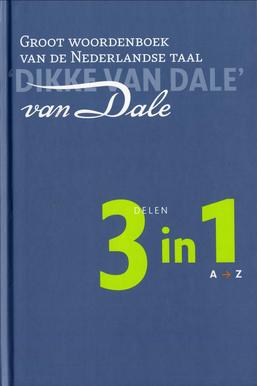Top Qs
Timeline
Chat
Perspective
Van Dale
Leading dictionary of the Dutch language From Wikipedia, the free encyclopedia
Remove ads
Van Dale Great Dictionary of the Dutch Language (Dutch: Van Dale Groot woordenboek van de Nederlandse taal, pronounced [vɑn ˈdaːlə ˌɣroːt ˈʋoːrdə(m)ˌbuk fɑn də ˈneːdərlɑntsə ˈtaːl]), called Dikke Van Dale ([ˈdɪkə vɑn ˈdaːlə], literal translation
"}]],"parts":[{"template":{"target":{"wt":"Literal translation","href":"./Template:Literal_translation"},"params":{"1":{"wt":"Thick Van Dale"}},"i":0}}]}">lit. 'Thick Van Dale') for short,[2] is the leading dictionary of the Dutch language. The latest edition was published in April 2022.Remove ads
History

Van Dale's dictionary was first published after the death of Johan Hendrik van Dale,[3] who had started work on his New Dictionary of the Dutch Language (Nieuw woordenboek der Nederlandsche taal [niu ˈʋoːrdə(m)ˌbuɡ dɛr ˈneːdərlɑntsə ˈtaːl]) in 1867.[4] This was built upon the original same-named 1864 dictionary of I.M. Calisch and N.S. Calisch. Van Dale did not see the new work published in his lifetime, as he died in 1872. It was finished by his student Jan Manhave. Today it is published by the private company Van Dale Lexicografie.[3][5]
Commonly nicknamed Dikke Van Dale ("thick Van Dale") and Grote Van Dale ("big Van Dale") due to its size, the dictionary is published in three volumes (A-I, J-R, S-Z). It is usually updated every 7–8 years, and the 15th edition was published in 2015.[6] Today there are compilations, pocket editions, electronic editions on CD-ROM and an online edition on the Van Dale website. The online edition includes a free version for the more common words, and a subscription-based professional version with access to the full 90,000-word dictionary.[7]
Remove ads
Position
The Van Dale Dictionary is a private endeavor, to be distinguished from the government-published "Green Booklet" that lists the official spelling mandated for schools and government employees. Van Dale includes the official spelling of the words as well, but it further provides their definitions. The position of the editors is clear: the actual use is decisive. Disapproved words are marked as such, but not omitted. The purpose is to inform the reader, therefore the responsibility of using certain words lies solely on them.
Remove ads
Editions
Summarize
Perspective
See also
References
External links
Wikiwand - on
Seamless Wikipedia browsing. On steroids.
Remove ads
